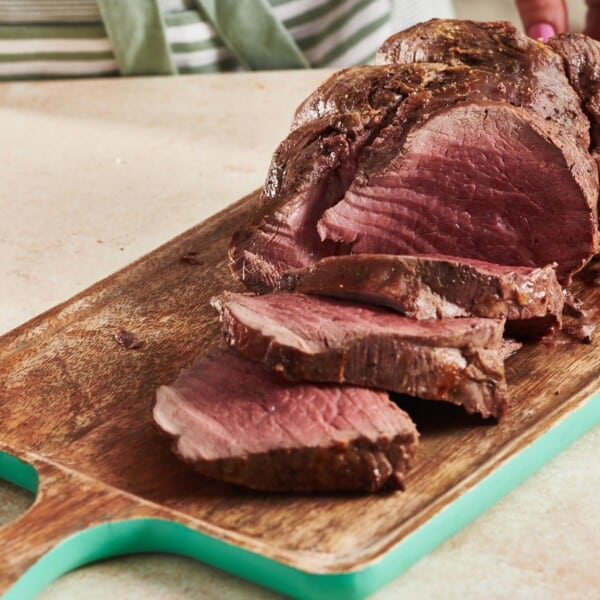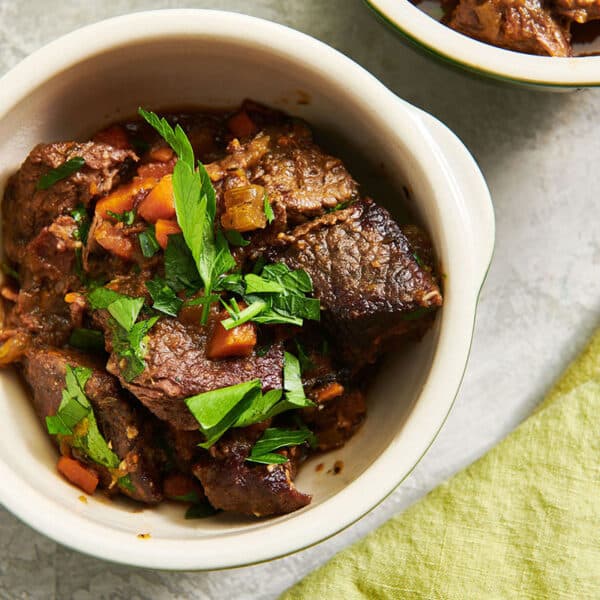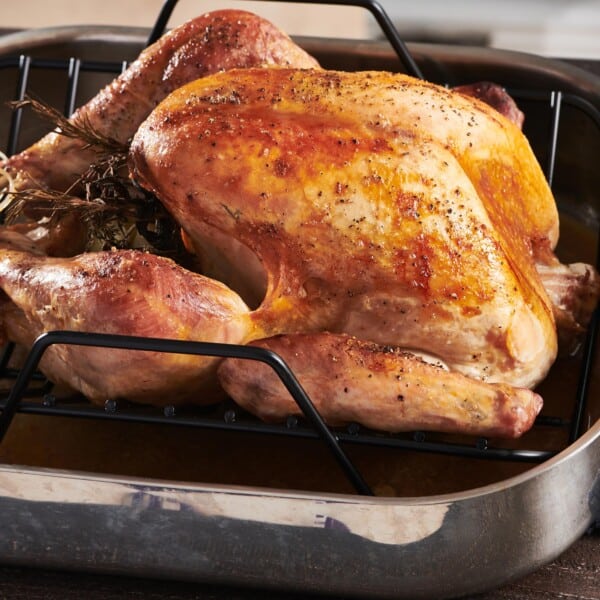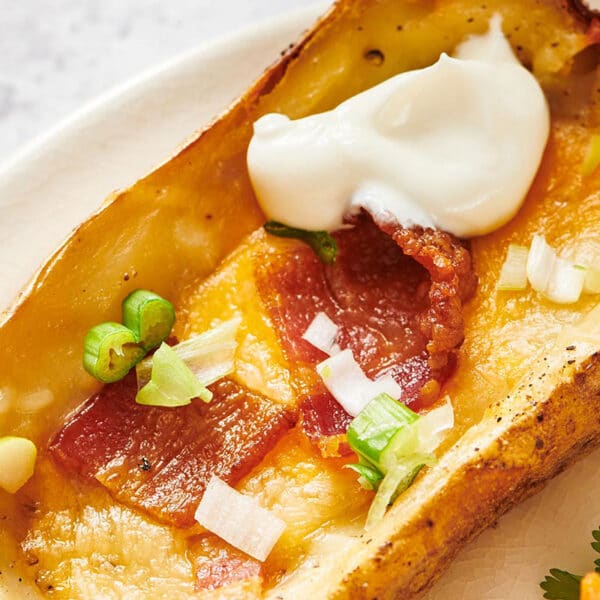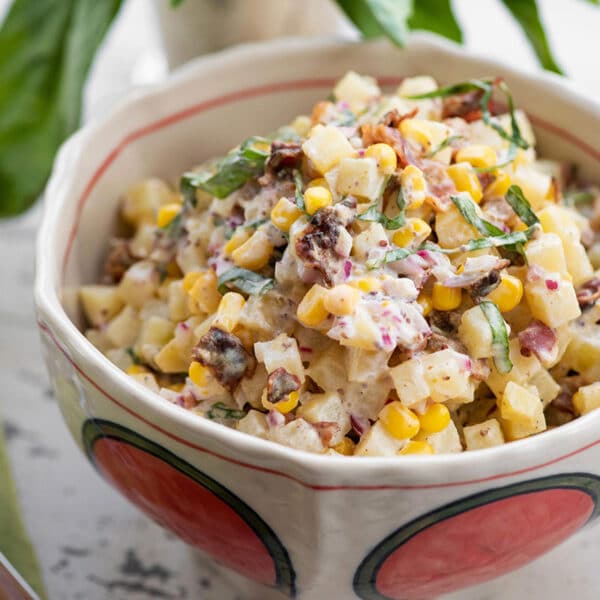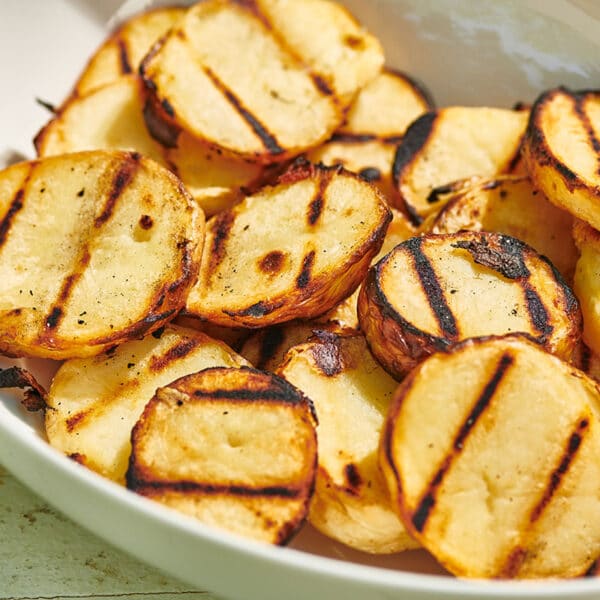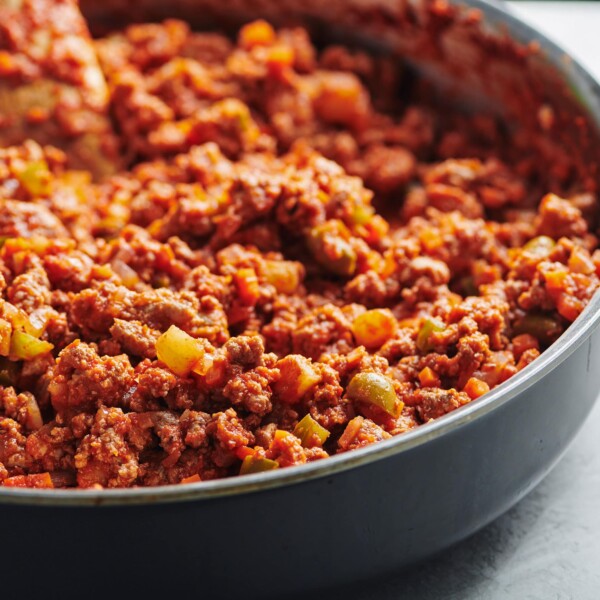Herb Mashed Potatoes
Updated Nov 21, 2025
This post may contain affiliate links. Please read our disclosure policy.
A silky-smooth mashed potato recipe with a burst of fresh herb flavor. This easy side dish pairs beautifully with everything from roast chicken to a holiday turkey and comes together with simple ingredients and fresh herbs you already have on hand.
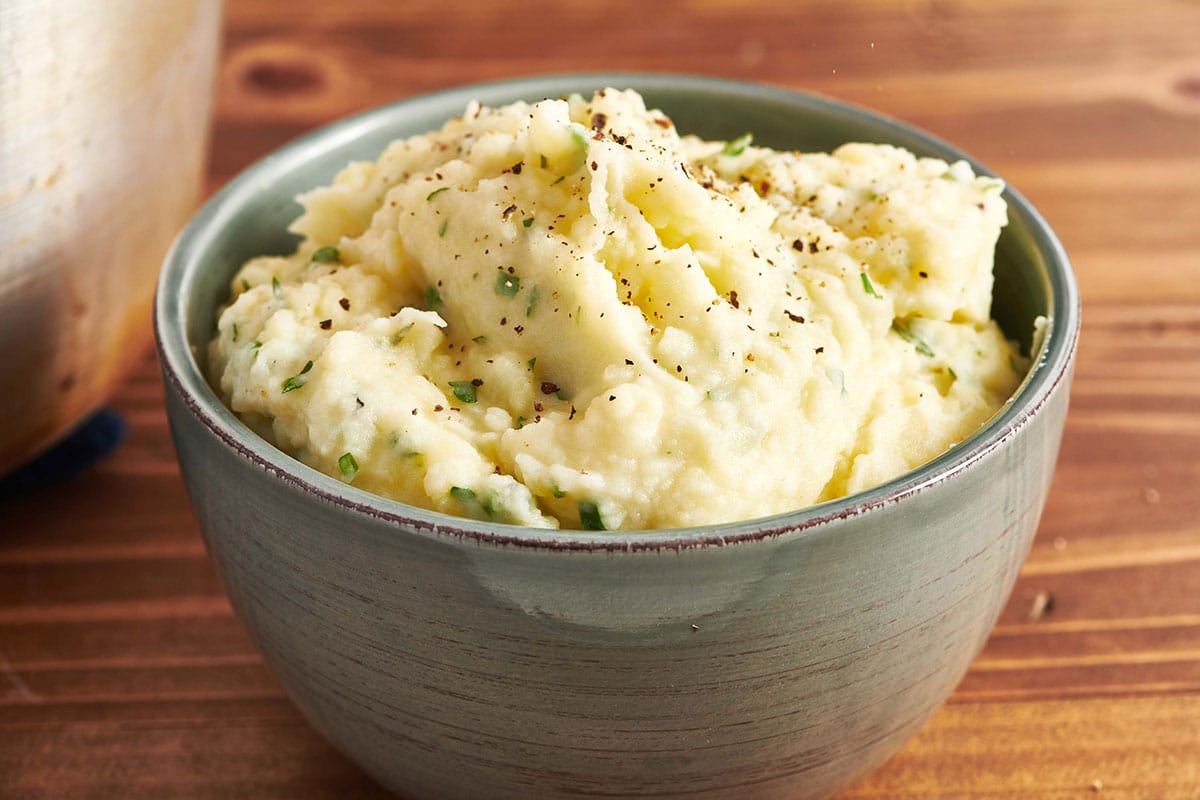
Mashed potatoes are already one of the world’s most beloved comfort foods, but add a few handfuls of fresh herbs and they become something truly irresistible. These herbed mashed potatoes are creamy, buttery, and perfectly seasoned, with just the right pop of brightness from chives, parsley, and tarragon. They look gorgeous on the table and taste even better – comforting yet fresh, familiar yet just a bit special. Serve them alongside everything from a weeknight roast to a festive holiday meal, and watch everyone go back for seconds.
Whenever I am asked what’s for dinner, if the answer includes “and mashed potatoes,” my people are extremely happy, and the main course matters not all that much. Herb mashed potatoes are perfect with Roast Chicken, Classic Meatloaf, or Grilled Rib Lamb Chops. For the holidays, serve them up with Cornish Game Hens or a Beef Tenderloin. And they are perfect with a Classic Roast Turkey for Thanksgiving.
And if you have leftovers, lucky you! You can make Mashed Potato Pancakes!
By signing up, you agree to our Privacy Policy.
What's In This Post?

Herb Mashed Potatoes: Choose your favorite herbs, and turn everyone’s favorite side dish into something extra special.
Choosing Herbs for Herb Mashed Potatoes

Think about the herbs that are in the other dishes you are making, and try to complement them with the herbs you choose for your potatoes. To avoid monotony, don’t use the same herbs. If there is thyme in your main course, try tarragon in your mashed potatoes, for instance.
You can successfully incorporate a variety of herbs into mashed potatoes, and changing up the combinations keeps things interesting. A single herb is also fine: fresh basil, thyme, parsley, tarragon, and sage are all good choices.
Different types of fresh herbs have different levels of intensity flavor-wise, so you’ll want to start with smaller amounts and add to taste. Herbs like sage and rosemary are quite pungent, so less is more with some of the “woodier” herbs, while with herbs like parsley, tarragon, oregano, basil, or chives, you can use a freer hand.
Ingredients
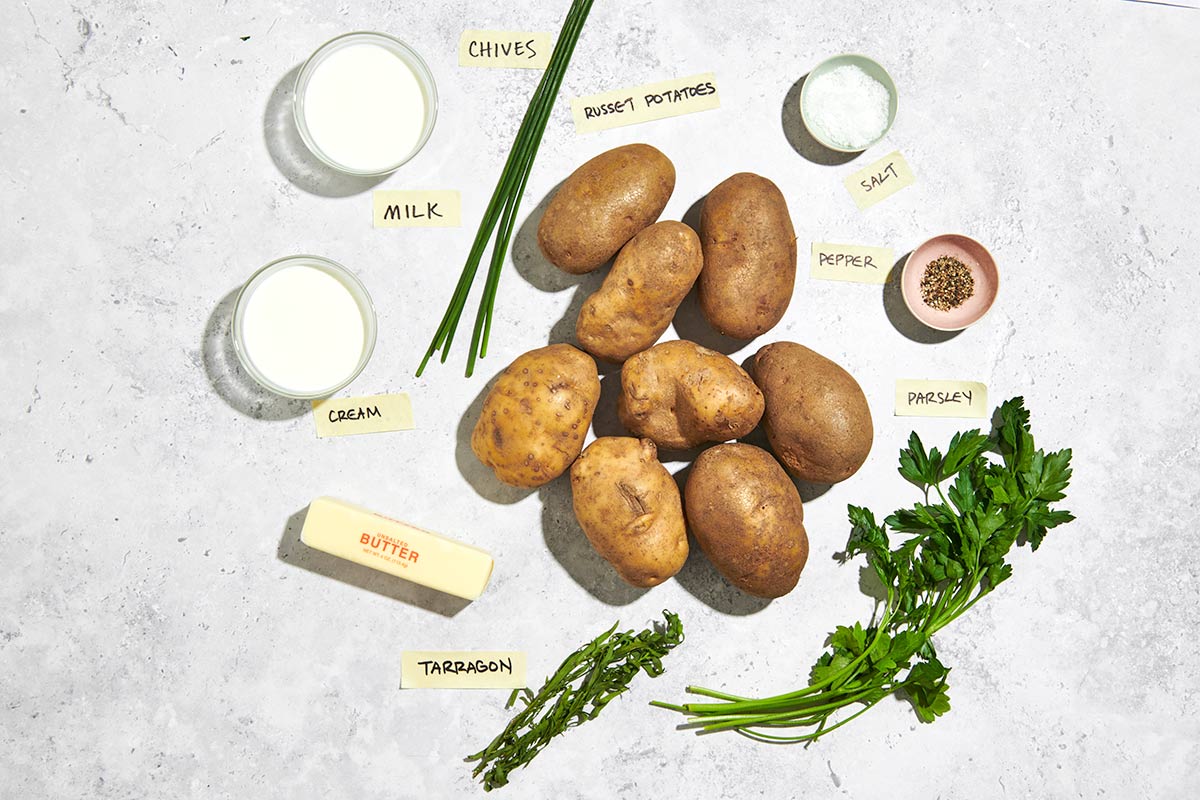
- Potatoes – I use Idaho Russet potatoes or Yukon Gold for this recipe.
- Butter – Helps the potatoes mash more easily and silkily, and seriously, butter with mashed potatoes? Yes, please.
- Milk – Use whole milk for an extra boost of creaminess.
- Light or heavy cream or half-and-half – You can decide how indulgent you want to be. Half-and-half is the lightest option, and heavy cream is the richest. You could also use additional whole milk if you’re practicing a bit of restraint.
- Chives, parsley, and tarragon – In this recipe, I used a mix of chives, parsley, and tarragon. In terms of the best herbs for mashed potatoes and mixing and matching herb combos, there are really no rules. If you like all of the herbs you are adding separately, then chances are you will like them all the more in combination.
How to Make Mashed Potatoes with Herbs (Step-by-Step)
- Boil the potatoes: Fill a large pot with salted water and bring to a boil. Add the potatoes (the water should cover the potatoes by at least 2 inches). Simmer for 15-20 minutes, partially covered, until the potatoes are very tender when pierced with a knife. Drain.
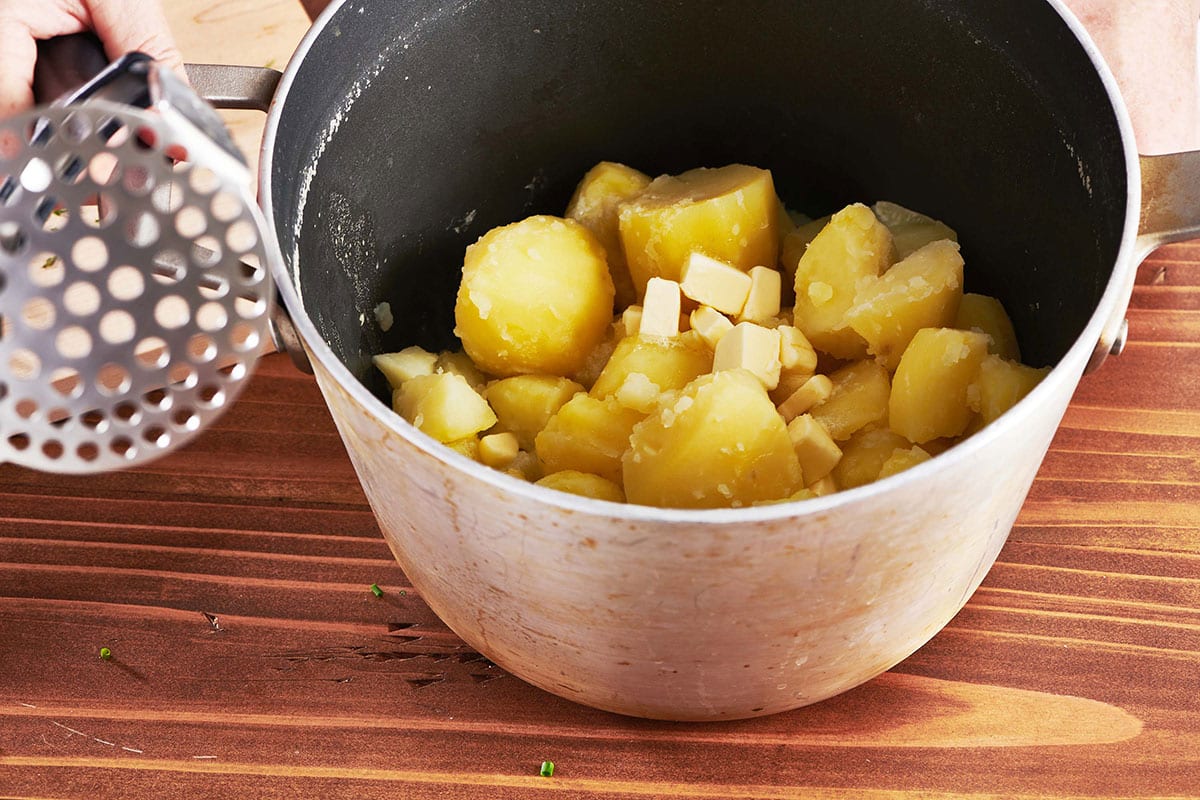
- Mash the potatoes: Return the potatoes to the pot and place them back over medium-low heat. Toss the potatoes in the hot pan occasionally for 3 minutes or so until the moisture is all gone and they have begun to dry out (but not to brown). Remove the pan from the stove, and put the potatoes through a food mill or potato ricer or mash with a potato masher. Return them to the pot. Meanwhile, heat the milk and the cream together.
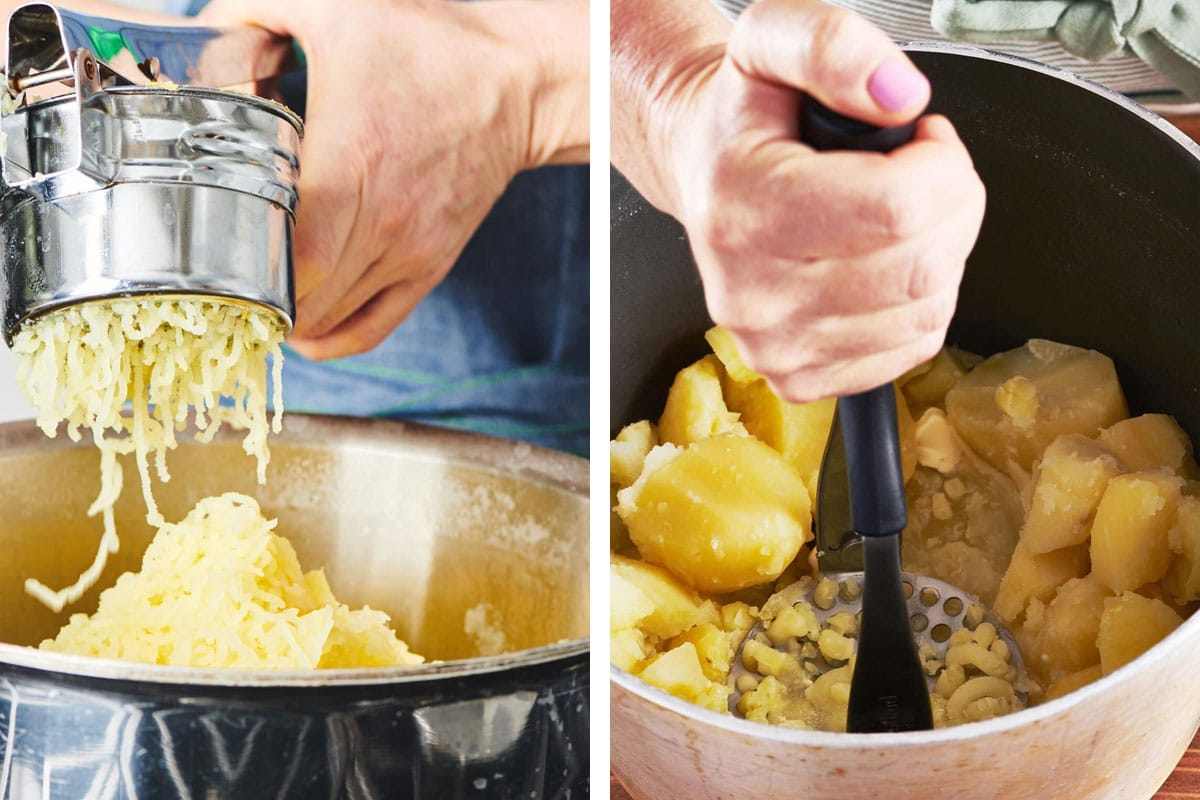
- Add dairy and herbs: Add the butter and the hot milk and cream mixture to the potatoes and stir until well combined. Blend in the chives, parsley, and tarragon, or the herbs of your choice.
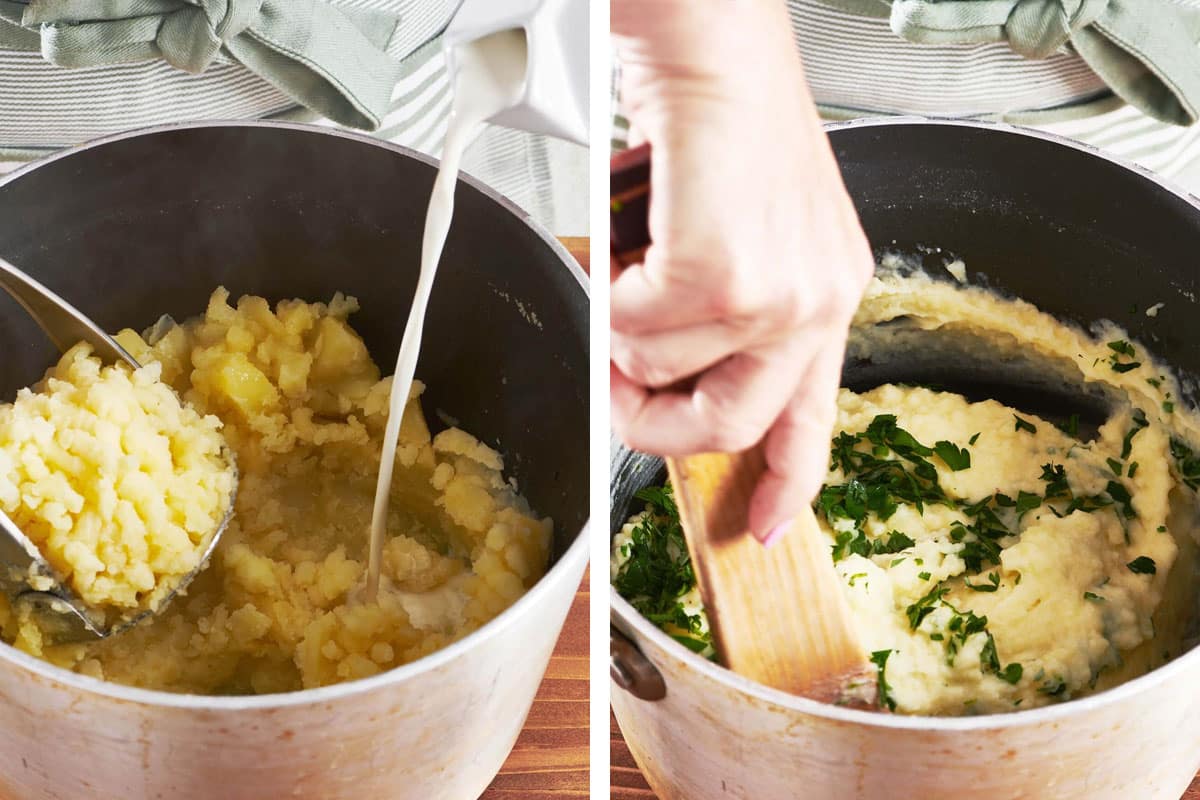
- Serve: Season with salt and black pepper to taste, and stir over medium-low heat until everything is hot and well blended.
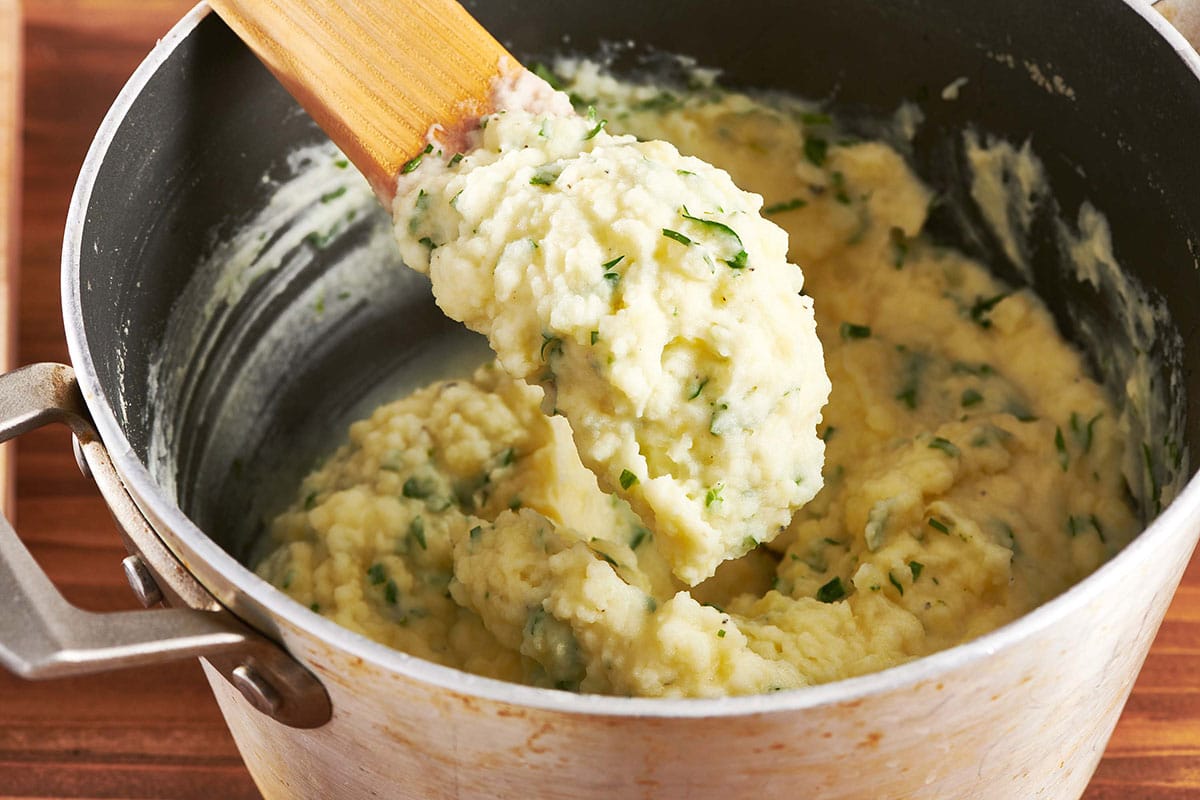
FAQS
Fresh herbs give the best flavor, and I heartily recommend them, but dried can work in a pinch. Use about ¼ to 1/3 of the amount of the chopped fresh herbs.
Keep them covered in a pot over low heat, stirring occasionally, or put them in a slow cooker on “warm” with a bit of butter on top.
Variations
- Add 4 to 6 roasted garlic cloves for creamy garlic herb mashed potatoes. You could also blend in a drizzle of garlic oil.
- Add a bay leaf to the water when you simmer the potatoes for another herbal note.

Tips for the Best Creamy Mashed Potatoes
- Warm your milk before adding it, and bring the butter to room temperature. Cold diary can make mashed potatoes gummy.
- Don’t overmix; it can turn the potatoes gluey. A gentle hand gives a light, fluffy texture.
- Keep them warm in a covered bowl or over a double boiler until serving.
- You can also keep them warm in a crockpot.
Make-Ahead and Storage Tips
- Herbed mashed potatoes can be made a day ahead. Reheat gently with just a splash of milk or cream. Store leftovers in an airtight container for up to 3 days.
- Herbed mashed potatoes don’t usually keep for as long as plain mashed potatoes, so keep that in mind.
- Reheat leftovers in the microwave or in a pot over low heat on the stovetop, stirring frequently. You may need to add more milk, cream, or butter if they are still thick once reheated.
What to Serve With Herb Mashed Potatoes
Pin this now to find it later
Pin It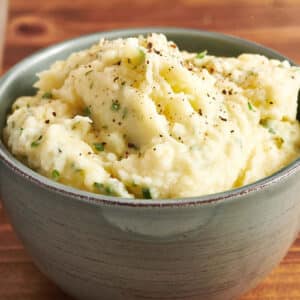
Herb Mashed Potatoes
Ingredients
- Kosher salt (for cooking the potatoes, plus 1 teaspoon or more; to taste)
- 8 large Idaho or Yukon Gold potatoes (3 to 3 1/2 pounds total; peeled and halved)
- ½ cup (1 stick) unsalted butter (cut into pieces; at room temperature)
- 1 cup whole milk
- ½ cup light or heavy cream or half-half (see Note)
- ½ cup chopped fresh chives
- ¼ cup chopped flat-leaf parsley
- 2 tablespoons chopped tarragon
- Freshly ground black pepper (to taste)
Instructions
- Fill a large stockpot with water and bring to a boil over high heat. Add a generous amount of salt, return to a boil, then add the potatoes (the water should cover the potatoes by at least 2 inches). Bring to a simmer, reduce the heat to medium, and continue to simmer for 15 or so minutes, partially covered, until the potatoes are very tender when pierced with a knife.
- Drain the potatoes, return them to the pot, and place them back over medium-low heat. Toss the potatoes in the hot pan occasionally for 3 minutes or so until the moisture is all gone and they have begun to dry out (but not to brown). Remove the pan from the stove, and put the potatoes through a ricer or mash with a potato masher until they are smooth, or as smooth as you like them. Return them to the pot. Meanwhile, heat the milk and the cream together in a microwave-safe bowl or pitcher for about one minute, until hot.
- Add the butter and the hot milk and cream mixture to the potatoes and stir with a wooden spoon or a whisk until well combined. Blend in the chives, parsley, and tarragon. Add salt and black pepper to taste, and stir over medium-low heat until everything is hot and well blended.
Notes
- Think about the herbs that are in the other dishes you are making, and try to complement them with the herbs you choose for your potatoes. Don’t use the same herb to avoid monotony — if there is thyme in your main course, try basil in your mashed potatoes, for instance.
- When you are heating up your leftover mashed potatoes, you may have to add a bit more milk or cream to loosen them up.
- Leftover herbed mashed potatoes will keep for 2 or 3 days – the herbs may discolor a bit, but that’s ok. Herbed mashed potatoes don’t usually keep for as long as plain mashed potatoes, so keep that in mind.
- Reheat leftovers in the microwave or in a pot over low heat, stirring frequently. You may need to add more milk, cream, or butter if they are still thick once reheated.
